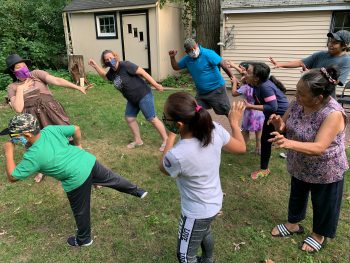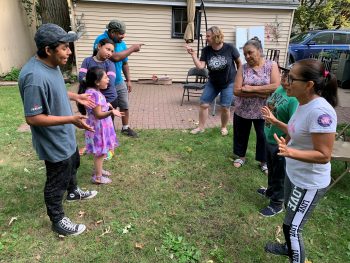Ministry Imagination Grants: Imagine. Innovate. Initiate.
By Nick Tangen
In a backyard in Richfield, a small group of people are using their bodies to illustrate the complexities and challenges of living through a national pandemic. Each person positions themselves in the scene to depict an image of pain, confusion, resilience, and community, all by only moving and posing their body.

Teatro del Tapiz participants practice body movement in preparation for acting. The bodily activity helps the actors deal with internatlized trauma.
This tableau includes children, adults, and seniors, some of them related, though all connected to Tapestry Church, a multicultural mission-start in Richfield, Minnesota. In 2019, this small congregation applied for a Ministry Imagination Grant from the Minneapolis Area Synod to incorporate theatre, storytelling, and the arts into congregational life, to accompany congregants in a process of discovering their voice and the sacredness of play.
“By focusing on the Spanish language, Pastor Gonzalez hoped to create some bridges between multiple generations and family members.”
“I believe in theater as this expressive means that isn’t always accessible, especially to kids of color and Latinos, and especially to those whose first language isn’t English in Minnesota,” said Tapestry’s Pastor Melissa Melnick Gonzalez. “[Theater] helps them to get outside of themselves and to see things from different perspectives.”
The initial proposal focused especially on the young people of Tapestry Church, committing to providing tools and practices of creative expression that could be delivered bilingually. Tapestry is itself a bilingual congregation and one of its main goals was to build a sense of pride in one another’s native languages and to make self-expression accessible for those who may not have community resources like theater and creative arts at their disposal.
“The other thing we were seeing between Latino kids who were born in the U.S., whose dominate language is English, and those who have more recently immigrated, whose dominate language is Spanish, there was bullying going back and forth,” said Pastor Gonzalez. “So, we wanted to focus on addressing bullying, and being open to others, and on really valuing the Spanish language.”
By focusing on the Spanish language, Pastor Gonzalez hoped to create some bridges between multiple generations and family members.
“Some of our kids as young as 7 or 8 won’t speak Spanish any more to their parents so, if they see other people showing love for them and their language and their culture, they may begin to value that as well. … You can accomplish a lot using theater techniques.”
TO COORDINATE AND LEAD these theater and sacred play opportunities, Pastor Gonzalez reached out to local artists “See More Perspective,” a hip-hop artist, spoken word poet, and social justice educator; and Katherine Parent, a musician and visual artist. The pair worked with Pastor Gonzalez to write curriculum, create costuming and set design, and lead sessions of creative play, under the title of Teatro del Tapiz.
 “Story and narrative are a big piece of healing for people,” said Parent. “If I can tell my story or express my own experience, through poetry, body movement, visual art, that has often allowed me to integrate experiences that were really hard to understand or were really traumatic. So, I think there is something potentially very powerful and healing in inviting others to make art that expresses their own stories and identities.”
“Story and narrative are a big piece of healing for people,” said Parent. “If I can tell my story or express my own experience, through poetry, body movement, visual art, that has often allowed me to integrate experiences that were really hard to understand or were really traumatic. So, I think there is something potentially very powerful and healing in inviting others to make art that expresses their own stories and identities.”
“As Teatro del Tapiz unfolds Pastor Gonzalez, See More Perspective, and Parent all hope to continue meeting with small groups and exploring a variety of experiences through play, theater, and the creative arts.”
“[Theater] has a lot to do with how people know themselves and each other in a different way,” said See More Perspective. “The pandemic – for all the trials it has put us through – does present a particular opportunity to see ourselves and those we are close to in a different way. So intergenerationally, for the older folks to see how profound some of these children’s insights are, or for the children to see how playful some of these older folks are [can be very powerful]. [We can] think about where we are in this time and place and how do we get through it. What are some of the tools that we can look to [in order] to make a difference?”
The original vision for the Imagination Grant was to create sets, costumes, and full performances that could then be performed at Tapestry or around the synod. This would give the participants an opportunity to practice courageous performance in front of an audience and to appreciate the way in which their story is heard. But as COVID-19 spread and as churches began to limit the size of gatherings, Pastor Gonzalez and her creative leaders had to adjust.
“We do three two-hour sessions with families and other leaders in their backyard,” said See More Perspective. “We get into a crash course: Let’s get to know one another; let’s try to challenge our imaginations; let’s start thinking in poetry and start to get into our bodies a little bit. We play theater games. We think about how different words taste in your ear, or how different senses can be translated through expression. And then slowly we get to, ‘what are you thinking about, what’s going on for you.’”
IT IS THESE QUESTIONS ABOUT the participants’ lives and the larger social issues that communities are facing that allows for each person to innovate new and creative ways to express their experience. The group has used theater games and poetry to talk about COVID-19, the murder of George Floyd, and other current events directly impacting the players.
“One of the things we talked about was addressing trauma,” said Pastor Gonzalez. “Trauma has been felt by this community from the virus and all that happened with George Floyd, and even Customs and Border Patrol in Portland, Oregon.”
Teatro del Tapiz’s focus on highlighting the Spanish language and the bilingual nature of Tapestry Church has also provided a unique and exciting opportunity to explore the ways in which communication happens among a truly multicultural community. This is of particular interest to See More Perspective, who is able to bring a shared cultural understanding as a Chicano artist.
“One of the things we talked about was addressing trauma. Trauma has been felt by this community from the virus and all that happened with George Floyd, and even Customs and Border Patrol in Portland, Oregon.”
“It’s beautiful because we’re coming in with this cultural connection to a specific and broader community,” said See More Perspective. “And being able to communicate on a cultural level, it’s one thing to speak and understand each other, but there is nuance to humor and even small talk. So, it’s very much about being seen and feeling that we’re not in this bubble, but our people are out there.”
“In the U.S., we’re in a dominant culture where whiteness and English speaking really dominate. So, it’s really easy for people to internalize oppression and to believe that speaking Spanish is less important, or less creative, or less valuable,” said Parent. “And the message I got from Pastor Melissa and others is that speaking Spanish is really important culturally.”
As Teatro del Tapiz unfolds Pastor Gonzalez, See More Perspective, and Parent all hope to continue meeting with small groups and exploring a variety of experiences through play, theater, and the creative arts. There is some potential for the leaders to revisit families and groups that have engaged some of these practices already and to see what new expressions may have been bubbling up since the last gathering.
“I’m just excited about the seeds that have been planted,” said Parent “We’re getting to know everyone, and seeing that people are artists in different forms. There are musicians, fiction writers, singers, cooks. Knowing that makes me excited for the future of Tapestry as they continue to invest in art, and what fruit that is going to bear down the line.”
Tapestry will continue to innovate and craft meaningful opportunities for self-expression among their community, helping to build bridges and cross them, as their mission statement reflects. In this way they extend that gracious invitation into life-giving Christian community, playfully and creatively building transformational relationships.

